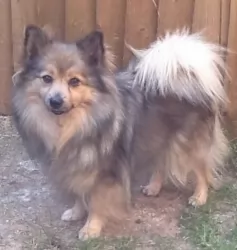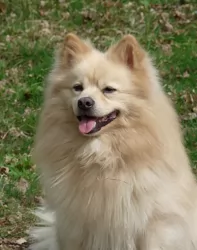 MyDogBreeds
MyDogBreeds German Spitz (Mittel) is originated from Germany but Belgian Shepherd is originated from Belgium. German Spitz (Mittel) may grow 28 cm / 11 inches shorter than Belgian Shepherd. German Spitz (Mittel) may weigh 19 kg / 41 pounds lesser than Belgian Shepherd. Both German Spitz (Mittel) and Belgian Shepherd has almost same life span. German Spitz (Mittel) may have less litter size than Belgian Shepherd. Both German Spitz (Mittel) and Belgian Shepherd requires Moderate maintenance.
German Spitz (Mittel) is originated from Germany but Belgian Shepherd is originated from Belgium. German Spitz (Mittel) may grow 28 cm / 11 inches shorter than Belgian Shepherd. German Spitz (Mittel) may weigh 19 kg / 41 pounds lesser than Belgian Shepherd. Both German Spitz (Mittel) and Belgian Shepherd has almost same life span. German Spitz (Mittel) may have less litter size than Belgian Shepherd. Both German Spitz (Mittel) and Belgian Shepherd requires Moderate maintenance.
 Originating in Germany, the German Spitz Mittel is an alert, vigilant dog and it is these qualities that made him sought after for working on farms.
Originating in Germany, the German Spitz Mittel is an alert, vigilant dog and it is these qualities that made him sought after for working on farms.
He is no new breed and is the 3rd largest of the five German Spitz varieties. It is believed that the German Spitz descended from the Northern sled and herding dogs which arrived with the Vikings into Europe. When you do research you see that the dogs are mentioned in German literature which dates way back to to 1450 already.
 There are different varieties of the Belgian Shepherd Dog – but these all differ only in color, length and texture of coat. The interesting aspect of the names of the different Belgian Shepherds, is that the names of the different varieties are taken from the individual towns in Belguim from which each variety comes from.
There are different varieties of the Belgian Shepherd Dog – but these all differ only in color, length and texture of coat. The interesting aspect of the names of the different Belgian Shepherds, is that the names of the different varieties are taken from the individual towns in Belguim from which each variety comes from.
This breed dates back to the middle ages, but it was only in 1891 that Professor A. Reul of the Cureghem Veterinary Medical School established standards for the types and actually separated- and distinguishing them. In the UK they are shown as one breed.
 The German Spitz Mittel is similar in looks to the other sizes of German Spitz. The Mittel is a medium sized dog and stands between 30 and 38cm in height and weighs between 7 and 11kg. You’ll find him in solid colors such as tan, liver, white, fawn, black or a mix of these colors.
The German Spitz Mittel is similar in looks to the other sizes of German Spitz. The Mittel is a medium sized dog and stands between 30 and 38cm in height and weighs between 7 and 11kg. You’ll find him in solid colors such as tan, liver, white, fawn, black or a mix of these colors.
He has a soft woolly undercoat and a long outercoat with a mane-like ruff at the neck. He has a fairly long muzzle, dark eyes, sharp erect ears and a bushy tail which curls over his back.
Affectionate, faithful, and always happy by nature, the German Spitz Mittel is a family companion that wants to be part of everything his human family is up to. He makes a good watchdog. He is alert and has a distrust of strangers.
He gets on well with children in the home and he can also live in peace with other dogs. Because he is an intelligent dog, you won’t have much trouble with training- and socializing him, although he will require a firm, consistent owner and trainer.
Training and socialization are important as there are always some important commands such as sit, stay, come and lie down that you will want him to respond to immediately.
 The Belgian Shepherd is a well proportioned, muscular medium-to-large dog breed. There are the different varieties but they generally stands at 56 – 66cm in height and weighs anything from 25 to 30kg. You get the short haired Malinois and then you also get the Belgian Tervuren and the Groenendal which are fairly long-haired varieties. Their colour shades vary so you can find black with white markings on the chest and feet, you can find light to dark brown and some are even inclined to be brown.
The Belgian Shepherd is a well proportioned, muscular medium-to-large dog breed. There are the different varieties but they generally stands at 56 – 66cm in height and weighs anything from 25 to 30kg. You get the short haired Malinois and then you also get the Belgian Tervuren and the Groenendal which are fairly long-haired varieties. Their colour shades vary so you can find black with white markings on the chest and feet, you can find light to dark brown and some are even inclined to be brown.
All the varieties have long tails, pointed, fully erect ears and black noses. While the Belgian Shepherd isn’t an aggressive dog, he makes an excellent guard dog, being alert, highly energetic and intelligent and easy to train. As with most other dogs, you’ll want to see to it that he is trained and socialized because then he makes a super pet suited to life with a family where there are children and other pets. He has an independent nature and is loyal and protective with his human family.
 People who have owned a German Spitz Mittel are delighted with him, saying that he is such an easy-going, happy dog. He is social and thrives on the interaction he has with his human family.
People who have owned a German Spitz Mittel are delighted with him, saying that he is such an easy-going, happy dog. He is social and thrives on the interaction he has with his human family.
He won’t do well if you simply put him in your backyard and forget about him, using him merely as a watchdog.
The German Spitz Mittel dog is one dog that definitely lives up to the title of man’s best friend. He is social, happy, loving, loyal, playful, entertaining and smart too, and when you treat him the way he deserves, you’ve got the most awesome friend.
 Energy is a big factor with this beautiful dog, so before you consider one as a pet, be sure that you can take care of his exercise needs. He belongs to the working group of dogs so he won’t enjoy just lazing around day after day. He is wired to be herding livestock and that natural instinct doesn’t disappear once he becomes a pet in your home. With so much energy, he wants a nice sized garden and wouldn’t do well cooped up indoors at all.
Energy is a big factor with this beautiful dog, so before you consider one as a pet, be sure that you can take care of his exercise needs. He belongs to the working group of dogs so he won’t enjoy just lazing around day after day. He is wired to be herding livestock and that natural instinct doesn’t disappear once he becomes a pet in your home. With so much energy, he wants a nice sized garden and wouldn’t do well cooped up indoors at all.
He is a strong, loving dog, and in exchange for your care of him, he will be a loyal, loving, protective friend who will love you to the end.
 German Spitz dogs are healthy, and when you shower him with love and attention and good food, you can expect to have him around for up to 15 years of age.
German Spitz dogs are healthy, and when you shower him with love and attention and good food, you can expect to have him around for up to 15 years of age.
Of course, as with any other healthy dog breeds, there are always one or two common dog illnesses that your dog may get. These include hip dysplasia and eye diseases. If you notice symptoms that indicate possible joint issues with your pet, get him to the vet immediately.
Patellar Luxation for instance occurs when your dog’s kneecap is dislocated. It is more common in toy breeds like the German Spitz. It can be painful for your pet and lead to lameness. If your dog has problems with his hip, it can actually force the patella out of its groove, which is a secondary condition.
 The Belgian Shepherd is a hardy dog so if you do your part to provide him with good quality nutrition from the food he eats and you exercise him, he’ll reach the 10-14 years allotted to him.
Just like with any dog, there will be some minor concerns that you need to watch out for -
The Belgian Shepherd is a hardy dog so if you do your part to provide him with good quality nutrition from the food he eats and you exercise him, he’ll reach the 10-14 years allotted to him.
Just like with any dog, there will be some minor concerns that you need to watch out for -
epilepsy, eye problems, cancer, skin allergies and hip dysplasia.
remember to check his teeth and for ticks and parasites as both, if just left, can jeopardise his health seriously.
see that he get his first puppy vaccinations at 6 to 8 weeks of age.
 You can help reduce loose hairs with your German Spitz by brushing his thick coat twice a week. It’s a good time to also inspect your dog for ticks and fleas.
You can help reduce loose hairs with your German Spitz by brushing his thick coat twice a week. It’s a good time to also inspect your dog for ticks and fleas.
Your German Spitz Mittel isn’t the most active dog, but he will still need regular exercise. Going on a walk is good for both you and him. He is a mentally sharp dog too and these walks keep him both physically- and mentally fit. He also loves ball games.
Every dog deserves the best food, and if you feed your German Spitz Mittel with a commercially manufactured dog food, make sure its one of the top quality ones. You want to avoid foods packed with preservatives, colorants and fillers. You want dog foods with minerals and vitamins with high protein and ingredients such as Omega 3 and 6 to promote health skin.
There are also some dog foods which have ingredients in them such as polyphosphates. Ingredients like this keep your dog’s teeth clean.
Try and also give him some cooked rice, vegetables and chicken mixed into his kibble from time to time as well as raw meat. He should never be without fresh, cool water.
 Your Belgian Shepherd is an energetic dog breed who is social and who wants to be included in your family activities. You can’t just keep him cooped up in your back yard and expect him to do well. He’ll need daily exercise – walks, swims if there is water close by, chasing the ball as well as your companionship.
Your Belgian Shepherd is an energetic dog breed who is social and who wants to be included in your family activities. You can’t just keep him cooped up in your back yard and expect him to do well. He’ll need daily exercise – walks, swims if there is water close by, chasing the ball as well as your companionship.
These dogs are shedders so you’ll certainly be needing to watch your clothes for hairs. You will need to give them a good brush at least twice a week to get rid of all that loose hair and to keep his coat shiny and in tip top condition. Also, he likes the closeness the brushing provides between him and his human caretaker.
The Belgian Shepherd is a robust, healthy breed of dog, but many ill dogs are brought to veterinary clinics because they are suffering with itchy skin problems, they have digestive problems and they’re generally run down. This is because they aren’t provided with a varied and balanced diet plan. Apart from eating a quality dry- or wet dog food as recommended by your vet, he’ll most certainly need some raw meat in his diet too.